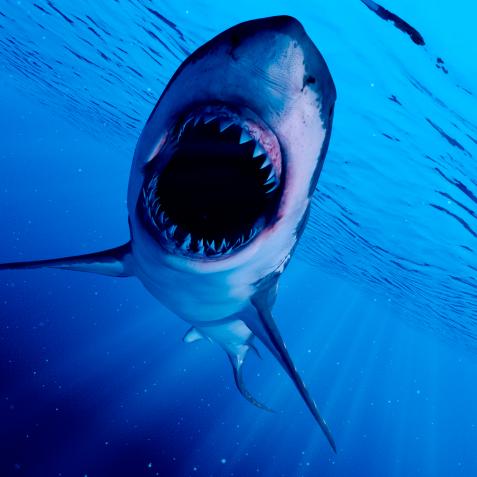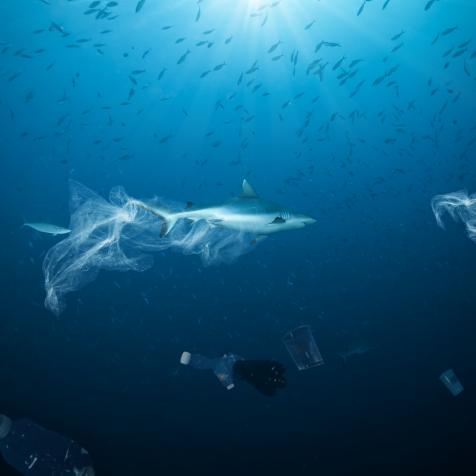
Jesse Colaizzi Productions, LLC.
Searching for Lost Sharks
Dr. Dave Ebert joined Animal Planet’s Forrest Galante in some of the most shark infested waters in the Southern Hemisphere to track down lost species on EXTINCT OR ALIVE: LAND OF THE LOST SHARKS. He let's us in on his experience.
I’m known as the Lost Shark Guy, and throughout my career, I have searched for those little known or unknown sharks and their relatives the flatsharks (rays and skates) and ghost sharks (Chimaeras). I have discovered over 50 new shark species and found numerous others not seen in decades!

Dave diving with Grey Reef Sharks.
For Shark Week this year, I teamed up with Forrest Galante and his team from EXTINCT OR ALIVE for the program LAND OF THE LOST SHARKS where we go in search of three lost Sharks from the east coast of South Africa, including one that had not been seen since 1984 and another that was discovered in 1902, but then lost over 100 years!

Dave and Forrest reviewing video of a Lost Shark in Kosi Bay, South Africa while Mitchell Long & Mark Romanov film.
Unlike other Shark Week programs I’ve done, the coolest part of this program was working with Forrest since we are “fellow travelers” searching for species that maybe extinct or entirely new to the outside world!

Jesse Colaizzi
Blacktip Sharks (Carcharhinus limbatus) off Aliwal Shoal, South Africa. Some of the unexpected wildlife encounters while filming Land of the Lost Sharks.
Once in the field, I am on a mission with a singular focus to find these sharks, and I don’t like to come back empty handed. However, what people do not always realize is the situation or circumstances that occur off camera and behind the scenes. The challenging situations, extreme weather and sea conditions, other wildlife such as poisonous snakes, hippos and crocodiles, and of course, the unknown and often unexpected things that happen while filming these programs.

Austin’s Guitarfish (Rhinobatos austini), a new guitarfish (flat shark) we encountered off Durban.
One unexpected species we found during the filming was a flatshark called a guitarfish that I discovered in South Africa three years ago. I named this new shark Austin’s Guitarfish after my nephew who is a shark enthusiast and as a college graduation present. So for me, it was pretty cool and unexpected to come across one of these sharks while filming.
Although people are watching to see the large toothy sharks we encounter--and we definitely encountered them--most don’t fully realize the circumstances we often find ourselves in. During the filming, there were days we would be miles offshore and in 10 foot seas with a real risk of the boat being swamped and leaving us stranded at sea or having to find divers “temporarily” lost at sea.

Dave in rough seas off Protea Bank to film Extinct or Alive: Land of the Lost Sharks.
Or there was the day I went to scout out a remote fishing village to see what kinds of sharks they might be catching. Well unbeknown to me, the village it turns out is in Mozambique, and I found myself surrounded by border guards armed with machine guns from South Africa and Mozambique asking why I was there. Once I explained, they all found it rather amusing and thought I was some kind of a Hollywood celebrity. You won’t see that in the show, but it all adds an unknown and unexpected element to these expeditions.

Jesse Colaizzi
Dave and Forrest with the Flapnose Houndshark (Scylliogaleus quecketii), a South African endemic species only occurs along a small stretch of coastline. This was one of three sharks we went in search of for Extinct or Alive: Land of the Lost Sharks.
Doing the type of research I have dedicated my life to, finding these lost sharks is a passion and requires an adventurous spirit, an explorer’s mindset, and a curiosity for discovery. I hope when people see the program they will feel that same sense, the energy and excitement of discovering long lost species. It’s frustrating, exhausting, exhilarating, yet the most rewarding experience you could ever imagine when you discover a species no one has seen in decades.
About Dr. Ebert

Dr. Dave Ebert, the “Lost Shark Guy”, is Director of the Pacific Shark Research Center.
Dr. Dave Ebert, the “Lost Shark Guy”, is Director of the Pacific Shark Research Center. You can follow Dave’s shark explorations on Facebook and Instagram.


















